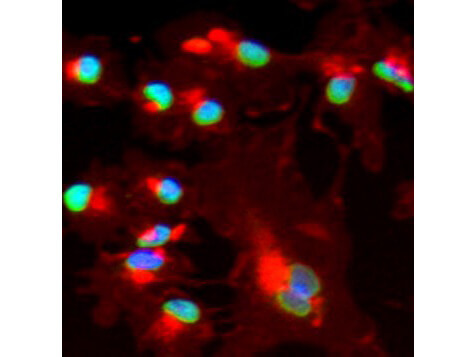Anti-BMI1 (GOAT) Antibody
BMI1 Antibody
- SPECIFICATION
- CITATIONS
- PROTOCOLS
- BACKGROUND

| Host | Goat |
|---|---|
| Conjugate | Unconjugated |
| Target Species | Human |
| Reactivity | Human |
| Clonality | Polyclonal |
Application
| WB, E, I, LCI |
| Application Note | This affinity purified antibody has been tested for use in ELISA, immunofluorescence, and western blot. A 1:200 dilution is reported to be effective for Immunofluorescence against Methanol fixed cells. Specific conditions for reactivity should be optimized by the end user. Expect a band approximately 37 kDa in size corresponding to Bmi1 by western blotting in the appropriate cell lysate or extract. |
| Physical State | Liquid (sterile filtered) |
| Buffer | 0.02 M Potassium Phosphate, 0.15 M Sodium Chloride, pH 7.2 |
| Immunogen | This affinity purified antibody was prepared from whole goat serum produced by repeated immunizations with a synthetic peptide corresponding to amino acids 252-264 of human Bmi1 protein. |
| Preservative | 0.01% (w/v) Sodium Azide |
| Gene ID | 100532731;648 |
|---|---|
| Other Names | 648 |
| Purity | This affinity purified antibody is directed against human Bmi1 protein. The product was affinity purified from monospecific antiserum by immunoaffinity purification. A BLAST analysis was used to suggest cross reactivity with Bmi1 protein from human, rat, orangutan, dog, chimpanzee, bovine and cat based on 100% homology to the immunogen sequence. This sequence shows significant homology to homologues from Xenopus and chicken sources. Reactivity against homologues from other sources is not known. |
| Storage Condition | Store vial at -20° C prior to opening. Aliquot contents and freeze at -20° C or below for extended storage. Avoid cycles of freezing and thawing. Centrifuge product if not completely clear after standing at room temperature. This product is stable for several weeks at 4° C as an undiluted liquid. Dilute only prior to immediate use. |
| Precautions Note | This product is for research use only and is not intended for therapeutic or diagnostic applications. |
| Name | BMI1 |
|---|---|
| Synonyms | PCGF4, RNF51 |
| Function | Component of a Polycomb group (PcG) multiprotein PRC1-like complex, a complex class required to maintain the transcriptionally repressive state of many genes, including Hox genes, throughout development. PcG PRC1 complex acts via chromatin remodeling and modification of histones; it mediates monoubiquitination of histone H2A 'Lys-119', rendering chromatin heritably changed in its expressibility (PubMed:15386022, PubMed:16359901, PubMed:16714294, PubMed:21772249, PubMed:25355358, PubMed:26151332, PubMed:27827373). The complex composed of RNF2, UB2D3 and BMI1 binds nucleosomes, and has activity only with nucleosomal histone H2A (PubMed:21772249, PubMed:25355358). In the PRC1-like complex, regulates the E3 ubiquitin-protein ligase activity of RNF2/RING2 (PubMed:15386022, PubMed:21772249, PubMed:26151332). |
| Cellular Location | Nucleus. Cytoplasm |

Thousands of laboratories across the world have published research that depended on the performance of antibodies from Abcepta to advance their research. Check out links to articles that cite our products in major peer-reviewed journals, organized by research category.
info@abcepta.com, and receive a free "I Love Antibodies" mug.
Provided below are standard protocols that you may find useful for product applications.
Background
The Bmi-1 oncogene (also known as polycomb group ring finger 4, MGC12685, murine leukemia viral (bmi 1) oncogene homolog, oncogene BMI 1, polycomb complex protein BMI 1 and RNF51) induces telomerase activity and immortalizes human mammary epithelial cells. Bmi-1 extends the replicative life span of human fibroblasts by suppressing the p16-dependent senescence pathway. The polycomb group (PcG) genes are involved in the maintenance of cellular memory through epigenetic chromatin modifications. Recent studies have implicated a role for PcG genes in the self-renewal of hematopoietic stem cells (HSCs), a process in which cellular memory is maintained through cell division. Among the PcG genes, Bmi-1 plays a central role in the inheritance of stemness, and its forced expression promotes HSC self-renewal. These findings highlight the importance of epigenetic regulation in HSC self-renewal and identify PcG genes as potential targets for therapeutic HSC manipulation.
If you have used an Abcepta product and would like to share how it has performed, please click on the "Submit Review" button and provide the requested information. Our staff will examine and post your review and contact you if needed.
If you have any additional inquiries please email technical services at tech@abcepta.com.













 Foundational characteristics of cancer include proliferation, angiogenesis, migration, evasion of apoptosis, and cellular immortality. Find key markers for these cellular processes and antibodies to detect them.
Foundational characteristics of cancer include proliferation, angiogenesis, migration, evasion of apoptosis, and cellular immortality. Find key markers for these cellular processes and antibodies to detect them. The SUMOplot™ Analysis Program predicts and scores sumoylation sites in your protein. SUMOylation is a post-translational modification involved in various cellular processes, such as nuclear-cytosolic transport, transcriptional regulation, apoptosis, protein stability, response to stress, and progression through the cell cycle.
The SUMOplot™ Analysis Program predicts and scores sumoylation sites in your protein. SUMOylation is a post-translational modification involved in various cellular processes, such as nuclear-cytosolic transport, transcriptional regulation, apoptosis, protein stability, response to stress, and progression through the cell cycle. The Autophagy Receptor Motif Plotter predicts and scores autophagy receptor binding sites in your protein. Identifying proteins connected to this pathway is critical to understanding the role of autophagy in physiological as well as pathological processes such as development, differentiation, neurodegenerative diseases, stress, infection, and cancer.
The Autophagy Receptor Motif Plotter predicts and scores autophagy receptor binding sites in your protein. Identifying proteins connected to this pathway is critical to understanding the role of autophagy in physiological as well as pathological processes such as development, differentiation, neurodegenerative diseases, stress, infection, and cancer.


